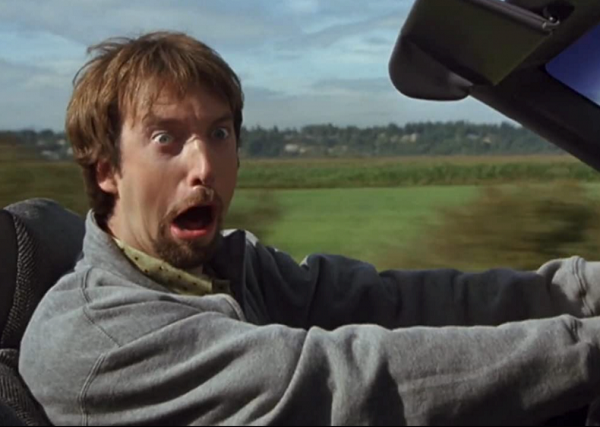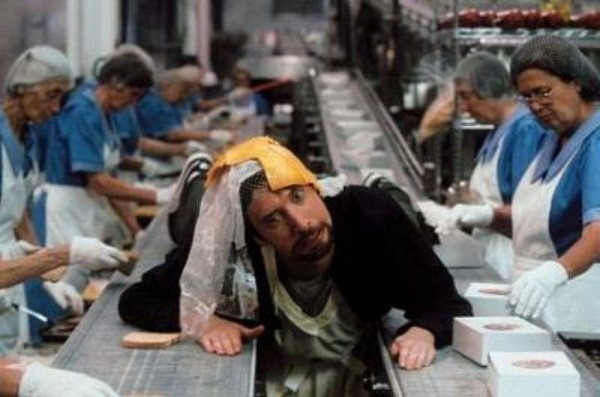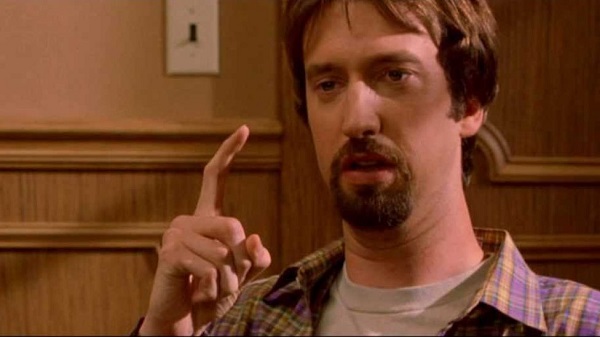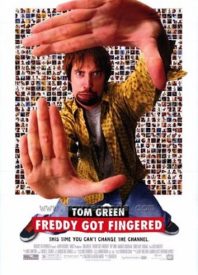
Spoilers for Freddy Got Fingered I guess?
There are many things that will baffle me to the end of time about the Trump administration. But one of the most baffling ones is that there are certainly people who watched The Celebrity Apprentice, and were somehow still of the belief that this man had any form of competency to be a government official of any kind, let alone the dang presidency. Celebrity Apprentice was terrible, terrible trash TV. The kind that featured E-list celebrities who were briefly famous for like a brief, yet definable, periods, who essentially groveled at the feet of a gross, egotistical narcissist while chasing five more minutes of fame. It was glorious, and terrible. And somehow that gross narcissist became the president of the United States because I hate it here.
As someone who was five during the Tom Green heyday, The Celebrity Apprentice was my introduction to Tom Green, whose appearance on the show was very brief. Green was gone within three weeks, eliminated for spending the first two episodes getting Dennis Rodman drunk, and annoying his teammates into a stupor. Green’s shtick of trying to aggravate everyone around him was not going to be a success on a show that we know for celebrity feuds.
Yet, Green is pretty much the ideal candidate for The Celebrity Apprentice. Green’s career was very brief, and yet contained enough notoriety that Eminem immortalized him in a song. For a couple of years, Tom Green could do no wrong, despite the fact that his show had little aesthetic value. Green had a hit single known as “The Bum Bum Song,” about how he could touch his butt to stuff. He was on the cover of Rolling Stone magazine. He married Drew Barrymore. And he made Freddy Got Fingered.
The phenomenon of cult cinema is an interesting one, if only because it suggests that some people are inherently “wrong” about a film. Cults don’t develop around über popular films. They sprout around the maligned, the underappreciated, the dismissed. They need a scapegoat. Someone who didn’t quite get the film when it debuted who fans can blame for the failures of their favourite film. For FFingered, this came in the form of Roger Ebert, who, at the height of his power, composed a legendary pan of Green’s magnum opus.
In 2001, Ebert could ostensibly ruin a film all on his own (he was one of the last critics to really have the ability to do so). If you don’t believe me, then I suggest you take a look at exhibit Brown Bunny. With Green’s film, Ebert set out to do the same. Some choice, and now infamous lines include, a description of the film being a “vomitorium,” suggesting that Green may want to carry extra protection to deal with engaged audiences. And the implication that the film was so far beyond the bottom of the barrel in its humour that the film didn’t “deserve to be mentioned in the same sentence with barrels.”
Ebert probably presumed that Green’s film would be unsuccessful, and he was correct. Fingered barely recuperated its budget, but critics did the real damage. While Ebert was the most notable negative voice, the film reached several milestones critically, including convincing the Toronto Star to create a special one-time rating of -1 stars. The film got eight Razzie nominations. Green infamously had to be dragged off stage following his acceptance of one of the film’s wins. Yet, the second Ebert penned the infamous barrels line, the film fulfilled its destiny as a cult favourite.
The critics are an easy target here, but there’s a specific element of stupidity defines Freddy Got Fingered. Much like Celebrity Apprentice, Green’s film is utterly baffling. There are a number of theories that people use to defend the film. And all of them are wild stabs at defining an undefinable film. Nathan Rabin’s closing praise for the film was to declare the film as being some sort of a “Dadaist provocation.” Some, for example claim it’s secretly a spoof of the Happy Madison films, designed to lampoon the stupidity of the Sandler branded form of arrested development that defined films like Happy Gilmore or Big Daddy. While I buy that to an extent, I’m not entirely certain that is truly Green’s intent. I also hesitate to suggest that Freddy Got Fingered is funny, or rather, that the film intends to be funny. In reality, I think the film is mean to be funny to exactly one person—Green himself. Anyone else is an added bonus.
The film is funny to Green because it melds his usual brand of early 21st century surrealism (in addition to thinly veiled epithets, most reviews mention Buñuel and Salvador Dali) to a run-of-the-mill stunted male gross-out comedy. Weirdly, there is a plot to Fingered, except that Green connects it to scenes in which he wears a deer carcass. Or an extended sketch of an animated TV series following a family of half-zebra centaurs where Green gets to over pronounce the word “hooves.”
This plot is insipid, there simply to give the film a sense of structure, but also to lampoon the larger Hollywood-industrial complex. Green plays Gord, a twenty-eight-year-old impressionist who is an excellent skateboarder, and not particularly qualified for anything else. This lack of qualification seems to be by design. Gord is Stepbrothers seven years before Stepbrothers, a walking, talking manifestation of male privilege and stunted development. Gord’s nemesis is his father Jim, played by Rip Torn in one of the truly all-time great performances. Jim seems routinely exasperated by Gord’s continuous refusal to integrate himself into the larger confines of society. We can find the central conflict of the film right here. Many scenes in this film follow this pattern: Green does something outlandish, and Torn oppositionally positions himself as the frothing naysayer. I once referred to this dichotomy as “the unstoppable force of human ridiculousness meets the immovable representation of ‘putting my foot down’.”
Gord’s nemesis is his father Jim, played by Rip Torn in one of the truly all-time great performances. Jim seems routinely exasperated by Gord’s continuous refusal to integrate himself into the larger confines of society. We can find the central conflict of the film right here. Many scenes in this film follow this pattern: Green does something outlandish, and Torn oppositionally positions himself as the frothing naysayer. I once referred to this dichotomy as “the unstoppable force of human ridiculousness meets the immovable representation of ‘putting my foot down’.”
Take, for example, the scene in which Gord’s friend Darren falls on Gord’s skate pipe and suffers a brutal looking compound fracture. Green makes sure to show the extent of the damage in a nauseating medium-close-up. That’s definitely a chunk of his femur sticking out of his leg. Gord then starts licking his caterwauling friend’s injury, one of the many obnoxious gags in the film. And one that is probably like, the fourth grossest moment in the film?
What makes this scene truly hilarious though is none of the gross out humour. But it finds that humour within a subtle gesture that Torn makes where he swats at the back of Gord’s head. Thinking about this logically for just a second, Torn’s response to what is a essentially a borderline sociopathic response that his son has to his friend’s gruesome leg injury is an annoyed “knock it off”. Weirdly, I found myself psychoanalyzing the conditions under which Gord seems to be growing up. His parents seem to be the definition of ineffectual.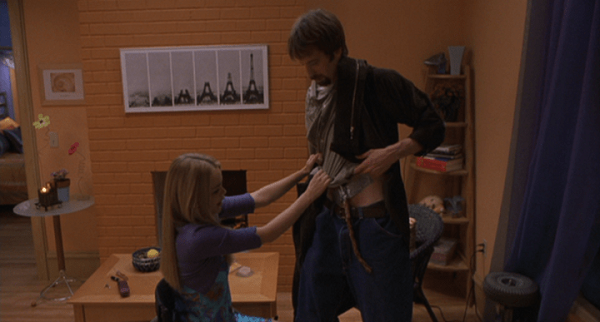 Torn desperately wants Gord to shed his skate kid aloofness and become a productive member of society, but cannot hide that desperation, which mean his gruff threats offer little masking to his heart’s desires. In turn, this is like waving red in front of a bull for Gord, who seems to have little motivation other than to raise his father’s blood pressure. Meanwhile, as Gord’s mother Julie Hagerty is here to do little other than play the most clichéd possible version of the doting mother.
Torn desperately wants Gord to shed his skate kid aloofness and become a productive member of society, but cannot hide that desperation, which mean his gruff threats offer little masking to his heart’s desires. In turn, this is like waving red in front of a bull for Gord, who seems to have little motivation other than to raise his father’s blood pressure. Meanwhile, as Gord’s mother Julie Hagerty is here to do little other than play the most clichéd possible version of the doting mother.
These clichés are working in the vein of the stunted adolescent gross-out male comedy. There is a grain of truth to the argument that Green’s film is partially mocking the larger idea of films such as Tomcats or BASEketball, which featured copious amounts of nauseating, fluid-based gags, and equally copious amounts of nauseating attempts at sentimentality. Fingered jumps between both with aplomb. The film will move from Gord chewing through an umbilical cord to a scene in which a mother is experiencing holding her child for the first time while the most aggravating plinking piano score attempts to goad the viewer into a sappy submission. Anytime you hear this score playing, your eyes cannot stop rolling.
One instance in which this happens involves Gord’s sort-of girlfriend Betty (Marisa Coughlin) failing to properly get her rocket-powered wheelchair to take off. Gord berates Betty’s failures in rocket science, comparing her struggles with deeply complicated fission-based physics to his inabilities to produce children’s drawings that have some semblance of sense. The plinking piano score attempts to tighten the emotional screws. But Green undermines it by mocking the way Betty pronounces his name. Gord is deeply unlikable, which lends credence to the theory that this is actually a satire of sorts; no one would deliberately make their lead this unlikable, and yet, constantly try to shove their moral redemption into our faces, right?
This, however, would require Green to be thinking several steps ahead of his audience. Something that seems to difficult to wrap your head around considered that this is a film where there are scenes that seem to be here purely because they’re gross or ridiculous. Freddy Got Fingered is a film which features a large mammal sexual stimulation set-up and pay off. Fingered has a brutal running gag with a small, next-door neighbour boy who routinely injured himself in disturbing ways.
Fingered derives its name from a baseless accusation that Gord makes against his father, claiming that he molests his straight-laced, younger brother named Freddy (Eddie Kay Thomas). There’s no pattern to the jokes, save for the fact that they’re kind of annoying. They’re some combination of slapsticks, vulgarity, facial acting, and taboo breaking. Truly, I believe that this film is intentionally funny to exactly one person—its director.
And ultimately, this is why the film feels a bit like a joke or a con so to speak. Green designed every choice in Fingered to make fun of the moviemaking process. Tet isn’t, and yet is. It’s deeply baffling, and confusing, and secretly brilliant. And probably the best example of the auteur theory one could possibly come up with. It’s also deeply entertaining. There’s something primal to Green’s film, which achieves its own demented logic. It might be the purest piece of artistry in the 21st Century. Daddy would you like some sausages kills me every time.

